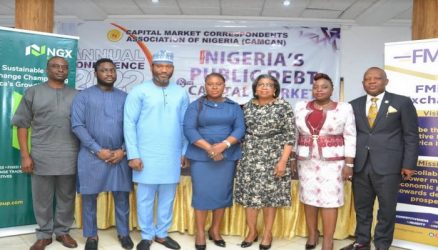Business
Nigeria must boost revenue to enhance debt sustainability – DMO

BY EMEKA EJERE
Extremely high debt service to revenue is an indication that urgent steps need to be taken to boost Nigeria’s revenue in order to enhance its public debt sustainability.
This was the submission of the Director-General of the Debt Management Office (DMO), Ms Patience Oniha, at the 2022 Capital Market Correspondents Association of Nigeria (CAMCAN) with the theme: “Nigeria’s Public Debt and the Capital Market held at the weekend in Lagos.
Oniha, who was the keynote speaker at the event, stressed the need for Nigeria to operate an efficient tax administration system that would ensure greater compliance to remittances devoid of all forms of evasions to tackle revenue challenges.
She said revenue challenge remains one of the most critical policy issues of the Federal Government currently threatening the nation’s debt sustainability.
Increased oil theft and petrol subsidy have conspired with other leakages to significantly reduce proceeds of oil sales, the main source of government revenue, in recent times.
Oniha noted that the in the face of tighter outlooks of both the local and international markets with rising interest rate, moderating Nigeria’s new borrowings, shoring up non-oil revenue and rationalising expenditure have become imperative.
Total public debt to Gross Domestic Product (GDP) of 23.06 percent as of June 2022, Oniha said, was still within Nigeria’s self-imposed limit of 40 per cent, the World Bank/International Monetary Fund (IMF) recommended limit of 55 per cent for countries within Nigeria’s peer group and 70 per cent for ECOWAS countries.
She, however, argued that debt service to revenue was extremely high, an indication that urgent steps needed to be taken to boost the nation’s revenue and enhance public debt sustainability.
“Nigeria’s public debt stock has grown consistently over the past decades and even faster in recent years. Consequently, debt service has continued to grow”, Oniha said.
“Nigeria’s low revenue base compounded by dependence on crude oil resulted in budget deficits over the past decades. Efforts at increasing non-oil revenue are yielding positive results.
“Dependence on borrowing and low revenue base are now threatening debt sustainability. With a low debt to GDP ratio, Nigeria’s debt service to revenue ratio would have been low if revenue was strong.
She observed that while most countries around the world have placed more emphasis on taxation as a principal source of funding for the government, the reverse is the case in Nigeria.
The DMO DG, who stated that borrowings must be tied to projects that would generate commensurate revenues to service loans used to finance the projects, added that physical assets such as idle or under-utilised properties could be redeveloped for commercialisation to generate revenue.
Oniha noted that Nigeria deploys debt management tools of the World Bank and IMF such as an annual Debt Sustainability Analysis (DSA) and a Medium Term Debt Management Strategy (MTDS) every four years in pursuit of debt sustainability.
The N20.51tn budget proposal with a deficit of N10.78tn is to be based on the key assumptions of oil benchmark estimated at $70 per barrel, oil production of 1.69 million barrels, exchange rate of N435.57 to $1, while inflation is expected to grow at 17.16 percent with GDP growth rate projected at 3.75 percent.
“We plan to finance the deficit mainly by new borrowings totalling N8.80tn: N206.18bn from privatisation proceeds and N1.77tn draw-downs on bilateral/multilateral loans secured for specific development projects/programmes.” President Muhammadu Buhari had said while laying the Appropriation Bill tagged, ‘Budget of Fiscal Sustainability and Transition.’ before a joint session of the National Assembly.
Expectedly, Key provisions of the Bill elicited reactions from major economy stakeholders, with most of them expressing concerns that the plan to fund the budget from borrowing will worsen the country’s debt burden.
Nigeria’s debt profile has been raising sustainability concerns. Data from the DMO showed an inexplicable rise in the nation’s total public debt from N12trillion inherited by the Buhari Administration in 2015 to the present debt profile of about N42trillion as of April 2022, an amount representing 83.9 percent of the country’s real GDP put at N72.39trillion last year.


